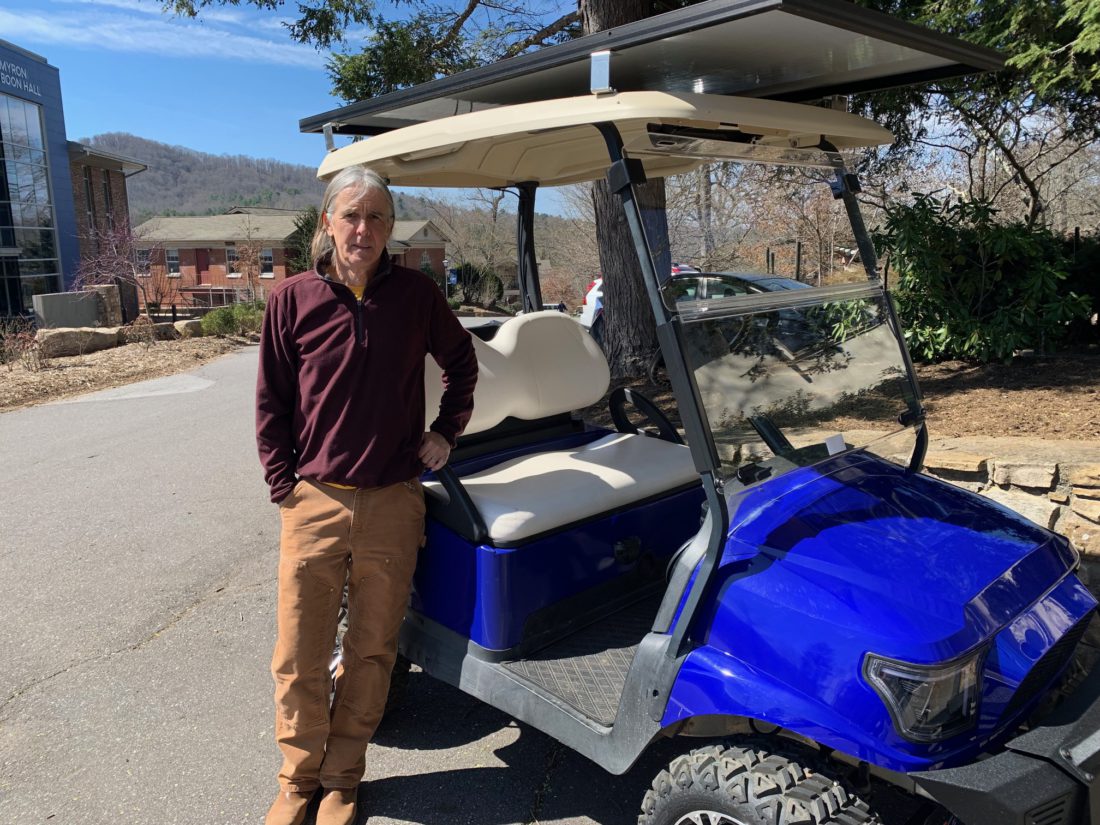When Warren Wilson College students threw an on-campus birthday party last fall, they didn’t need electricity to run the lights or power the sound system.
Instead, they simply plugged everything into the school’s fleet of 10 “mobile microgrid work vehicles,” which started life as traditional golf carts, but now run entirely on solar power. The carts use lightweight lithium iron phosphate batteries rather than heavy lead-acid batteries, says Dave Ellum, dean of land resources for the Swannanoa liberal arts school.
Each cart has a 330-watt solar panel mounted to its roof and an AC inverter that allows it to provide power wherever it is.
“This is a sustainable way to move people and provide energy,” Ellum explains. “One of our work crews could take it out to a site, set up a sawhorse, plug in their drills or power tools and run them right off the vehicle’s energy source, which is why it’s called a mobile microgrid.”
The initiative is a joint venture among Warren Wilson College and two other groups: Asheville’s Critical Services Microgrid Group and the UNC Asheville/N.C. State mechatronics engineering program. Mechatronics is a field that applies mechanical, electrical, computer and software skills to smart technologies.
Founded in 2020, the Critical Services Microgrid Group is made up of professionals in energy, information technology and engineering. Its goal is to encourage the city of Asheville and Buncombe County to evaluate the costs and benefits of a local microgrid to support essential services.
Warren Wilson provided funding through private donations — about $3,000 a vehicle — while the UNC Asheville/N.C. State program put three engineering students to work on the project last summer, says N. Moorthy Muthukrishnan, a professor in the program and a member of the micogrid group. Keith Thomson, co-founder of the microgrid group, procured the necessary equipment, including lift kits, body parts and solar panels, Muthukrishnan says.
In addition, four Warren Wilson students worked on other aspects of the project.
“The main thing is that the students get a lot of hands-on experience,” Muthukrishnan says. “It’s been a source of pride for students as well as our group.”
Working vehicles
Of the 10 vehicles at Warren Wilson, two were built from nonworking golf carts that were slated for the scrap heap. The rest were upgraded from functioning gasoline-powered carts.
“The first one was actually on a junk pile,” Ellum explains. “We had to use the forklift. It had no wheels; it was totally broken down. We had to take it off a pallet with a forklift and put it on the truck to get it to the workstation.”
One microgrid vehicle is used by Warren Wilson’s admissions department as a way to demonstrate to parents and prospective students the school’s efforts in innovation. Another is used by the school’s president and is taken to conventions and other events to show off the technology, Ellum says.
The rest are used by work programs, such as the paint crew, the IT department and the facilities management department.
“We never have to plug them into the grid,” Ellum says. “They’re completely self-sufficient as long as you park them in the sun. I still try to get people to remember that you can’t park them under a tree.”
UNCA has one mobile microgrid work vehicle operating on campus and is seeking funding for a second, Muthukrishnan says. In addition, the engineering program is working on a fleet management system that would allow computers to remotely track such things as a vehicle’s current charge and location.
Five engineering students are working on the project, he says, with each taking on a different component, such as the hardware, the database and the GPS.
“They said this was the first time they got to do a tangible product,” he says.
In addition, Warren Wilson is looking for ways to partner with entrepreneurs and other funding sources to develop the vehicle program into a viable commercial enterprise, Ellum says. The first step in the process was completed in the fall, when business student Zach Taylor developed a business plan.
Taylor, who graduated in December, says he found that a business that produced and shipped conversion kits for people to convert their own carts would be more practical than one that did the conversions itself. The kits would come with instructions, a battery, a solar panel and other pieces of equipment that would allow someone to convert a cart or other vehicle.
“You’re not making a ton of money off of each kit compared to each conversion, but just with the labor hours you can make a lot more kits,” he explains. “Kits would definitely be the easiest way to start the business. And then there’s always room to grow into conversions.”
None of the technology used in converting the carts is proprietary, he says. “Anyone that knew what they were doing and had a decent understanding of solar could order every item off Amazon or eBay. It’s the idea to bring it all together, the expertise in making it an efficient and well-working system, that’s what we bring to the table.”
Ellum is enthusiastic about the long-term benefits of the vehicle program.
“There are thousands or, I would argue, millions of these derelict golf carts all over the country,” he says. “So, what we want to do is start gathering those up and start refurbishing and putting them back into use rather than putting them onto trash piles.”



Our intergenerational, interdisciplinary, intercollegiate, experiential learnin, professional and student collaboration network includes five UNC Asheville Computer Science Seniors who are programming the fleet management system.
The Mobile Microgrid Work Vehicles have all been converted from lead acid to solar charged lithium iron phosphate batteries.
https://www.unca.edu/programs/sustainability/microgrid-research-group/
https://www.unca.edu/programs/sustainability/microgrid-research-group/support/
Cool